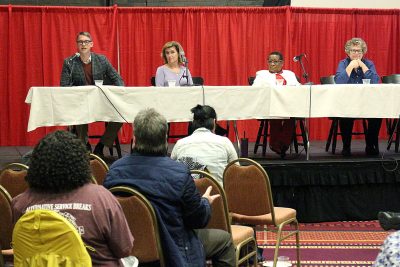
Boston University professors and students alike gathered in the Metcalf Ballroom to discuss the question of young people in political action and celebrate National Voter Registration Day Tuesday night.
The panel featured professors Mary Collins, Christopher Martell and Virginia Sapiro, who discussed the topic of youth participation in the political sphere. It was hosted by the Howard Thurman Center for Common Ground.
Martell, social studies education program director in the Wheelock College of Education and Human Development, said before the talk that young people are often perceived as not participating in politics.
“Often younger people engage in politics in harder ways, such as talking to their peers or their community members about what they care about, or they might attend political protests or use social media to raise awareness about a certain issue,” Martell said.
Social media was a hot topic of the night, with student attendees saying they agree that they receive much of their political information through various social media fields.
Collins, a professor of social welfare policy in the School of Social Work, said before the panel that she believes young people want to be politically active, but the key is to make this accessible.
“I do think that they are interested in being engaged in their communities, and I do think they often are engaged in their communities,” Collins said. “I think that some recent elections have demonstrated the importance of voting, and I think that they may have encouraged more young people to vote in upcoming elections, and might have in the past.”
The concept of voting as a habit was a recurring topic throughout the forum. The panel discussed this in conjunction with higher voting turnout among older generations. Younger people have not yet formed the habit, the panelists said.
Sapiro, a political science professor, wrote in an email before the panel that she believes that government is the avenue through which decisions about a country’s quality of life and foreign policy are made.
“In every generation, young people have been least like[ly] to participate in crucial aspects of politics, especially voting and elections,” Sapiro wrote. “Why leave the crucial decisions about the future to other people?”
During the forum, Sapiro discussed the lack of voter turnout in the nation as a whole, and among all generations.
“When I talk to you about age differences in politics and comparing different generations and different ages, contextualize that with the fact that in the United States, we don’t tend to vote as much as people vote in other democracies,” Sapiro said. “There are a lot of reasons for that. One of the most important is we take it for granted. But another of the most important is we are among the only countries that make it difficult to vote on a systematic length.”
The HTC held the event because it is important to give students and professors an opportunity to have open discussions about current topics, HTC Associate Director Pedro Falci said.
“Our goals are just to create the opportunities for students to learn about a current event from multiple layers, and thanks to our faculty’s expertise, go a little bit deeper than we would were we just to read a news story,” Falci said before the event.
Madison Crosby, a senior in the College of Arts and Sciences, said the speakers, especially Martell and Sapiro, introduced ideas she had never before considered.
“Especially when [Martell] brought up the idea that not voting is almost a way of protest, it was just really interesting.” Crosby said. “I thought he brought up a lot of points I hadn’t really thought of before.”
CAS senior Meghan Volcy said she appreciated the HTC’s facilitating the event and how it allowed students to hear from professors they might not otherwise meet. It was interesting, she said, to hear an education professor’s stance on the issue of young voter participation.
“I think something really important in terms of politics is education, whether that is teaching kids to get ready to vote, or supporting people in general who are of age to vote,” Volcy said.
























































































































Virginia Sapiro • Sep 26, 2018 at 7:21 am
Thanks for the great coverage. Here is also a very important part of the story to add: This panel was part of the monthly BU Student-Faculty Forum, a monthly presentation and discussion event begun last year, that occurs once a month. Organized by Virginia Sapiro, Professor of Political Science and Dean Emerita of CAS, and now with the assistance of a student advisory board, we pick a topic of pressing current importance each month, organize an interdisciplinary panel of faculty to share their expertise, have them make short presentations, then open up for general discussion. Last year’s topics included Lessons from Charlottesville; MeToo/YouToo: What We Know about Sexual Harassment; Korea, War, & Diplomacy; Human Genome Editing: Promise or Peril? and The Immigrant Executive Order (“Muslim Ban”). Look for notice of the October Forum, and please join us. The BU Student-Faculty Forum is sponsored by the Thurman Center.